Methods of Primary Data Collection in Research Methodology
Master the top methods of primary data collection in research methodology. Learn to use surveys, interviews, and experiments to gather original, high-quality data.

Esther F
When students initially learn about conducting a corporate governance research paper, they tend to be confused about where to start. The name is daunting, along with its mix of law, finance, ethics, and management.
Most students are left confused over whether corporate governance is all about legal compliance, boardroom behaviours, or ethical choices. Such confusion at the start makes it challenging to design research questions or identify scholarly sources.
Corporate governance is the system of rules and practices that direct businesses, ensuring accountability while shaping public trust, policy, and economic stability. For MBA, law, and commerce students, writing a research paper on this topic is more than academic—it’s a chance to explore real-world business issues. Topics such as board diversity, shareholder rights, ethics, and risk management underscore its relevance.
A well-structured paper not only proves academic skill but also prepares students to contribute to business strategy and governance reforms
Corporate governance is based on a set of principles that make sure companies conduct business ethically and sustainably. It is characterised by responsibility, fairness, transparency, and accountability.
Transparency makes it possible for a company to make its financial and operational decisions transparent, while accountability makes it so that the management is answerable to the shareholders and the board.
Fairness is the safeguard of the rights of all stakeholders, including minority shareholders, and responsibility enhances ethical business decision-making. The two principles together enhance the efficiency of corporate government, with governance structures being stronger and more dependable.
Corporate governance success also relies to a great extent on the position of its stakeholders. Its board of directors remains at the centre, providing oversight and strategic guidance. Shareholders bear an influence on decision-making power through their ability to invest, with management groups responsible for executing strategies. Regulators also set up compliance standards that protect financial markets and preserve public confidence.
Ironically, the corporate governance efficiency approach also differs by geography. In developed nations, corporate governance arrangements of companies are more formalised, with tighter regulation and stronger protection for investors. Developing nations, on the other hand, are likely to have weak enforcement, prevalent ownership, or opacity.
It is just a question of highlighting why corporate governance just so happens to be one of the most important areas of study—success or failure could well decide profitability in business, as well as economic stability around the world.

Select a topic that considers academic relevance and timeliness as well as ongoing issues in governance. Board diversity, executive pay, shareholders' rights, corporate social responsibility, and ethical leadership are concerns that are still topical because they directly relate to business accountability and investor confidence.
The best topic should allow room for conceptual analysis as well as implementation. Research into the failure of governance in multinational corporations can expose system faults, while research into good governance systems exposes best practices that can be emulated. This balance provides the paper with scholarly richness and applicability.
As a subject is settled before, reviewing what has already been researched is necessary. Reading sources such as the review of corporate governance research papers makes it easy to identify frameworks, avoid duplication, and identification of gaps that new studies can fill.
Finally, the topic of choice should illustrate interest on the part of the researcher as well as make a significant contribution towards governance discourse. A well-selected topic not only adds to scholarly learning but also places the researcher in a position where he/she can contribute to wider debates on corporate governance reforms.
Preparation of a research paper on corporate governance requires a systematic approach to ensure accuracy and credibility. Since governance cuts across law, finance, and ethics, researchers need to be aware of selecting methods and sources accordingly in line with what they want to obtain. Some of the following methods are most commonly used in governance studies:
Handled quantifiable information such as the interaction between board composition and company performance.
Examines deeper results into leadership styles, ethics, and decision-making culture.
Combines them both to provide a better understanding of governance practices.
In general, corporate governance researchers employ instruments like surveys, case studies, and financial analysis. Surveys are especially employed to gather managers', shareholders', or employees' views on governance practices, illustrating how rules are interpreted at various levels of the organisation.
Case studies, however, offer in-depth investigations of actual corporate failure or success and enable researchers to cast light on governance loopholes or emulate best practices that ensure stability.
Financial data analysis is also a strong approach since it utilises statistical models to examine the relationship between governance indicators like board diversity, audit quality, or shareholder rights and firm performance. These techniques collectively form a balanced method of unifying qualitative depth with quantitative precision for corporate governance research.
Be confidential when using survey or interview information.
Be accurate and unbiased when reporting governance matters.
Treat sensitive issues like fraud or misconduct with integrity.
It takes a precise structure to write a research paper on corporate governance so that it is clear, profound, and scholarly. The Abstract forms the first part, and it must contain a brief overview of the aims of the paper, the approach used, and the most significant conclusions. The Abstract serves as an instant guide to help readers grasp the nature of the research.
The Introduction comes next, which is the context by defining corporate governance, mentioning the problem statement, and outlining why the subject is important to companies, policymakers, and scholars. It establishes the justification for conducting the research.
A robust Literature Review positions the paper within the scholarship. It looks into pertinent theories, frameworks of governance, and prior research on topics like board composition, transparency, shareholder rights, or ethical practices. The process pinpoints areas of knowledge gaps and validates the direction of the research.
The Methodology discusses the research design, methods, and data sources, being quantitative, qualitative, or mixed. Explicit explanation of sampling methods and modes of analysis validates credibility.
In Results & Discussion, the author presents results, discusses them against current literature, and considers implications for corporate governance policies. Here is where critical comparison and analysis arise.
Conclusion & Recommendations conclude the paper, with key findings, key implications for business and regulators, and future research directions.
Lastly, References should be given in APA or Harvard format, reflecting academic integrity and giving credit to past work. Adhering to this framework not only provides academic excellence but also makes meaningful contributions to governance studies.

Solid proof comes with a good research paper. Make use of current and reliable sources like peer-reviewed journals, government reports, and credible industry magazines. This supports your argument and generally makes your work more credible.
A good paper is more than one-sided arguments. Think of counterarguments and provide evidence before condemning them. This process illustrates depth of analysis and refuses to bias your argument.
Case studies utilise reality. Citing examples of corporate governance practices, reforms, or failures makes you fill the gap between theory and reality, thus making your paper worthwhile and insightful.
Organisation is key to making a difference. Organise your paper logically from start to finish with smooth transitions between segments. Write in short and precise language so that it is readable, so your research will not be lengthy and ineffective.
An impactful research paper uses credible sources, presents balanced viewpoints, and integrates case studies for practical relevance. Maintaining a clear, logical flow ensures readability and persuasiveness. For deeper guidance, students may explore Ondezx’s Research Paper Writing assistance.
Corporate governance research has a central role in comprehending how organisations promote accountability, transparency, and ethical behaviour. Studying matters such as diversity at the board level, shareholder rights, and risk management generates valuable inputs by promoting not only theoretical knowledge but also improving actual-world governance practices.
Adopting best research practices guarantees study validity, equilibrium, and efficacy, as well as inviting elevated standards in corporate decision-making.
For scholars wishing to make their findings available to the broader professional and research community, publishing comes next. Getting credible guidance on publishing a research paper can help researchers communicate their research in the best possible manner, gain maximum visibility, and become part of the ongoing discourse in the discipline.
By combining thorough research with dissemination, students and professionals can make a lasting contribution towards both scholarship as well as governance.
Master the top methods of primary data collection in research methodology. Learn to use surveys, interviews, and experiments to gather original, high-quality data.
Don’t write your methodology without reading this. Learn why purposive sampling is essential for case studies and how to define your inclusion criteria. Url:purposive-sampling
Master the chapterization of thesis to ensure logical flow. Learn the standard academic framework for organizing research into a professional, approved document.
A practical guide to sentiment analysis research papers covering methodologies, datasets, evaluation metrics, research gaps, and publication strategies.
Master data analysis for research papers. Learn quantitative and qualitative methods, cleaning, and reporting standards to ensure your study meets journal rigour.
Want to impress your peers? Discover the best ways to condense your research, avoid common mistakes, and handle tough questions at any academic conference.